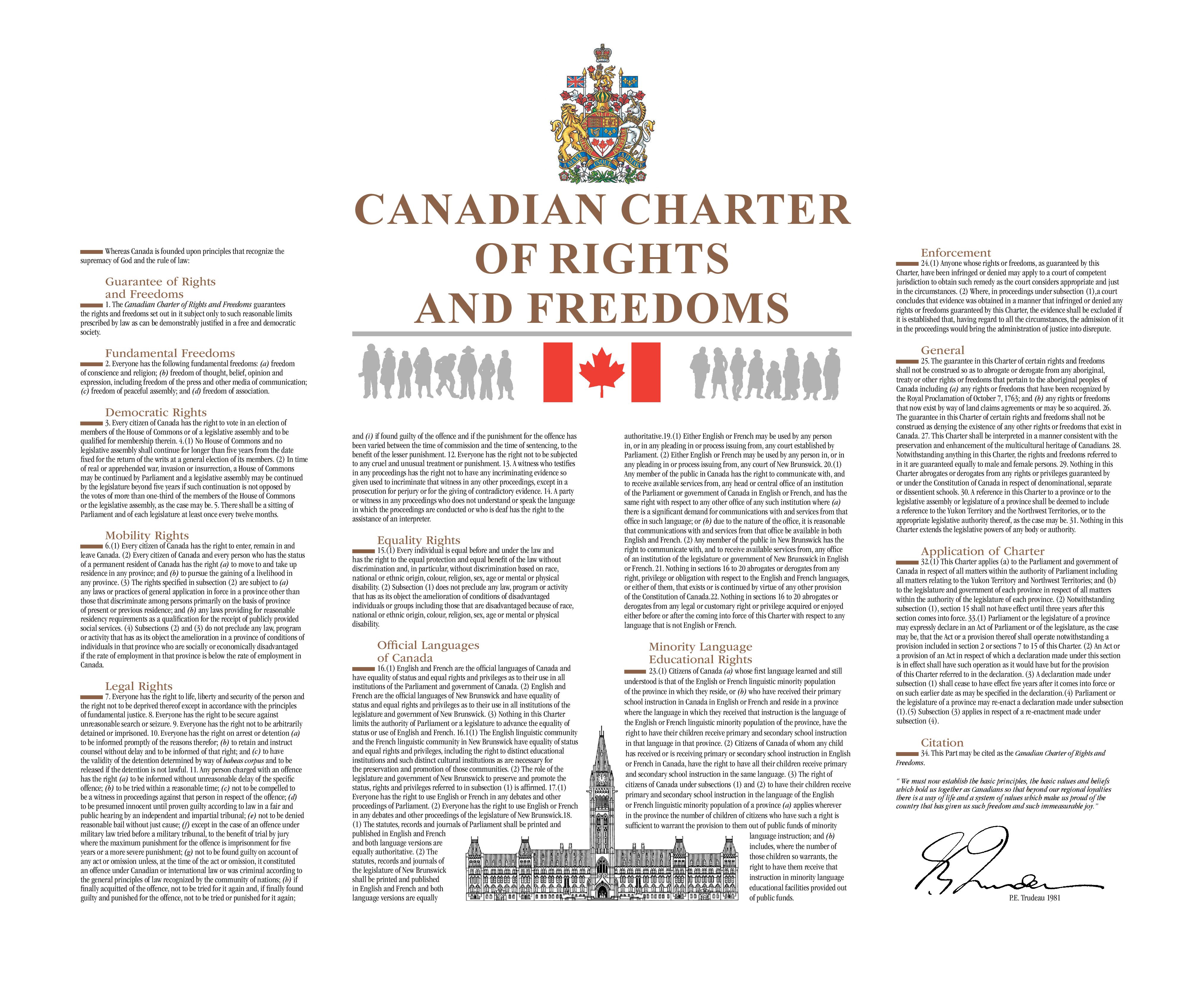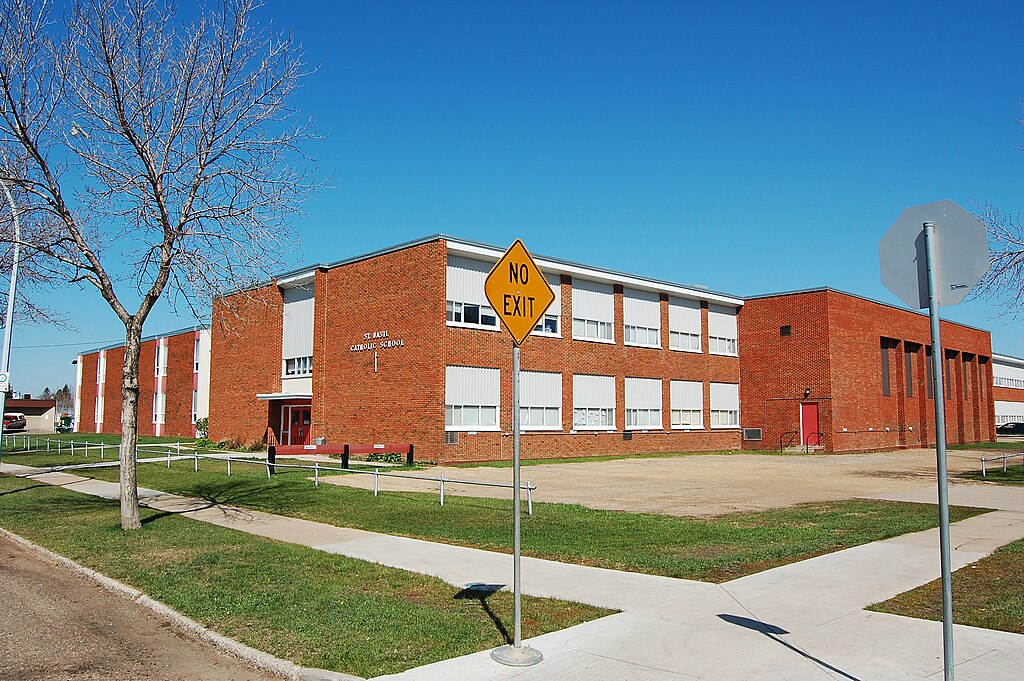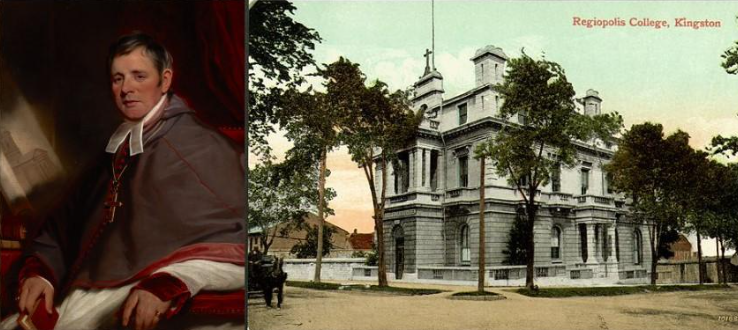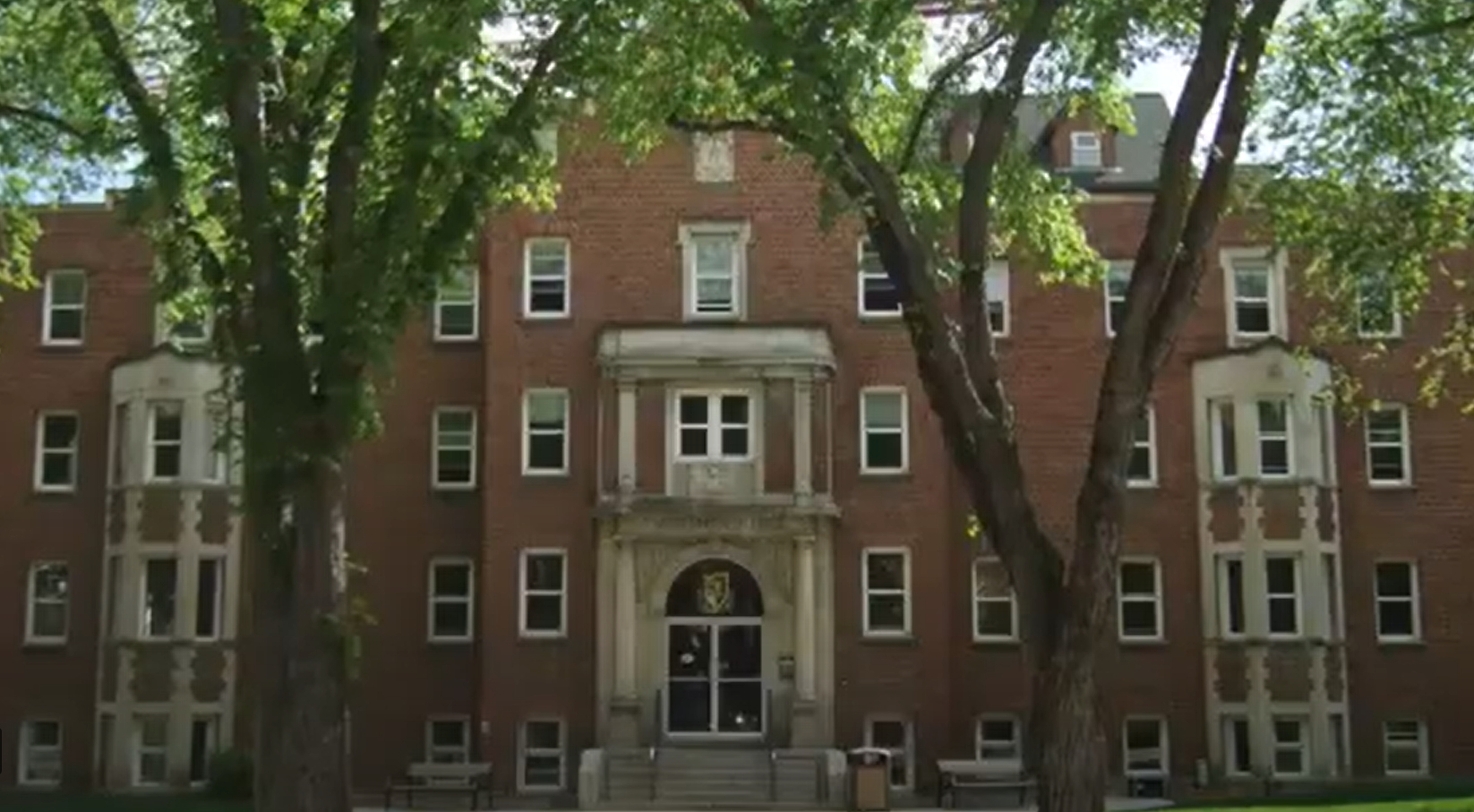- Details
- Written by Kevin P. Feehan
- Category: Legal
This article was originally published in the Fall 2013 issue of The Catholic Dimension, and is re-posted here for public reference.
It is trite to affirm that Catholic separate school constitutional rights derive from Section 93(1) of the Constitution Act, 1867:
“. . . nothing in any such Law [in relation to education] shall prejudicially affect any right or privilege with respect to Denominational schools which any Class or Persons have by Law in the Province at the Union”;
and Section 17 of the Alberta Act, 1905:
“ ... nothing in any such Law [with respect to education] shall prejudicially affect any right or privilege with respect to separate schools which any class of persons have at the date of the passing of this Act under the terms of chapters 29 and 30 of the Ordinances of the North-west Territories, passed in the year 1901, or with respect to religious instruction in any public or separate school as provided for in the said ordinances.”
It is also clear that those constitutional protections survive challenges under the Canadian Charter of Rights and Freedoms, as specified in section 29:
“Nothing in this Charter abrogates or derogates from any rights or privileges guaranteed by or under the Constitution of Canada in respect of denominational, separate or dissentient schools.”
The law, however, provides another set of rights, apart from the constitutional protections specifically with respect to Catholic separate schools, which are of importance to the Catholic community; the Charter protection for freedom of conscience and religion.
Firstly, the preamble to the Charter states:
“Whereas Canada is founded upon principles that recognize the supremacy of God and the Rule of Law ...”.
Section 2(a) contains the basic guarantee of religious freedom:
“Everyone has the following fundamental freedoms:
(a) freedom of conscience and religion ...”.
After the enactment of the Charter, the first decision of the Supreme Court of Canada to analyse the content and breadth of this guarantee of freedom of conscience and religion was Big M Drug Mart [1985], a case in which a convenience store in Alberta was charged with being open on Sunday, contrary to Alberta’s Lord’s Day Act.
Big M Drug Mart specifically addresses what is embodied in freedom of religion:
“A truly free society is one which can accommodate a wide variety of beliefs, diversity of tastes and pursuits, customs and codes of conduct. A free society is one which aims at equality with respect to the enjoyment of fundamental freedoms…. Freedom must surely be founded in respect for the inherent dignity and the inviolable rights of the human person. The essence of the concept of freedom of religion is the right to entertain such religious beliefs as a person chooses, the right to declare religious beliefs openly and without fear of hindrance or reprisal, and the right to manifest religious belief by worship and practice or by teaching and dissemination (para. 94).
Freedom can primarily be characterized by the absence of coercion or constraint. If a person is compelled by the state or the will of another to a course of action or inaction which he would not otherwise have chosen, he is not acting of his own volition and he cannot be said to be truly free ....
Freedom in a broad sense embraces both the absence of coercion and constraint, and the right to manifest beliefs and practices. Freedom means that, subject to such limitations as are necessary to protect public safety, order, health, or morals or the fundamental rights and freedoms of others, no one is forced to act in a way contrary to his beliefs or his conscience (para. 95).
... The Charter safeguards religious minorities from the threat of ‘the tyranny of the majority’ ”. (para. 96).
In determining what rights are protected under section 2(a), and the rest of the Charter, the Supreme Court of Canada has adopted a purposive approach:
“The meaning of a right or freedom guaranteed by the Charter is to be ascertained by an analysis of the purpose of such a guarantee” (para. 117).
The Court also said that the interpretation of a fundamental freedom should be a “generous rather than a legalistic one, aimed at fulfilling the purpose of the guarantee and securing for individuals the full benefit of the Charter’s protection” (para. 118).
The Supreme Court of Canada said in Big M Drug Mart that the purpose of such provisions is to protect the “notion of the centrality of individual conscience and the inappropriateness of governmental intervention to compel or to constrain its manifestation” (para. 122). It also stated:
“... an emphasis on individual conscience and individual judgment also lies at the heart of our demographic political tradition. The ability of each citizen to make free and informed decisions is the absolute prerequisite for the legitimacy, acceptability, and efficacy of our system of self-government... (para. 123), and
... The values that underlie our political and philosophical traditions demand that every individual be free to hold and to manifest whatever beliefs and opinions his or her conscience dictates, provided, inter alia, only that such manifestations do not injure his or her neighbours or their parallel rights to hold and manifest beliefs and opinions of their own.... Equally protected, for the same reasons, are expressions and manifestations of religious non-belief and refusals to participate in religious practice” (para. 124).
In Edwards Books, the Supreme Court of Canada wrestled once again with the Sunday closing issue addressing the Ontario Retail Business Holidays Act determining that the Ontario statute had no religious purpose, required closing only “on holidays” and contained numerous exceptions, allowing the opening on holidays of corner stores, pharmacies, gas stations, flower stores, fresh fruit and vegetables stores or stands during the summer months, educational, recreational or amusement services, prepared meals, laundromat services, boat and vehicle rentals, business necessary to promote the tourist industry, and in limited circumstances, any business that was closed on Saturday for religious purposes. The Court found that even though the Act infringed or denied the “freedom of religion of Saturday-observing retailers” that infringement was justified under section 1 of the Charter, which both guarantees the rights and freedoms set out in the Charter and constrains them to such reasonable limits prescribed by law as can be demonstrably justified in a free and democratic society.
However, the Supreme Court of Canada, in the Edwards Books case, made some further interesting comments on the scope of freedom of religion. It said that government interference with conscience and religion will be prohibited whether it is direct or indirect:
“It matters not, I believe, whether a coercive burden is direct or indirect, intentional or unintentional, foreseeable or unforeseeable. all coercive burdens on the exercise of religious beliefs are potentially within the ambit of s. 2(a)” (para. 97).
It also said, importantly:
“The purpose of s. 2(a) is to ensure that society does not interfere with profoundly personal beliefs that govern one’s perception of one’s self, human kind, nature and, in some cases, a higher or different order of being. These beliefs in turn govern one’s conduct and practices. The constitution shelters individuals and groups only to the extent that religious beliefs or conduct might reasonably or actually be threatened. For a state-imposed cost or burden to be proscribed by s. 2(a) it must be capable of interfering with religious belief or practice. In short, legislative or administrative action which increases the cost of practicing or otherwise manifesting religious beliefs is not prohibited if the burden is trivial or insubstantial” (para. 98).
Another leading case with respect to the interpretation of section 2(a) of the Charter is the “succah” case from Montreal, Syndicat Northcrest c. Amselem [2004], under section 3 of the Quebec Charter of Human Rights and Freedoms, equivalent to section 2(a) of the Canadian Charter of Rights and Freedoms. In that case, a number of Orthodox Jews built succahs on the balconies of their condominiums; a 3-walled, opened-roofed structure commemorating the forty year period during which the Children of Israel wandered in the desert, and in which they claimed they were to reside during the 9 day festival of Succot in late September or early October. The condominium association claimed each year that the balconies were communal property, and that the building of the succahs on the balconies infringed the condominium bylaws, building codes and adversely affected the aesthetics of the condominium building. The condominium association brought an action for an injunction requiring the succahs to be dismantled.
The Supreme Court of Canada, in holding for the Jewish residents, recognized the foundational principal set out in Reference re: Secession of Quebec [1998] that an important feature of the Canadian constitution was respect for minorities “which includes, of course, religious minorities” and that “respect for and tolerance of the rights and practices of religious minorities is one of the hallmarks of an enlightened democracy ... exist(ing) in a matrix of other correspondingly important rights (and) ... coexist(ing) alongside societal values that are central to the make-up and functioning of the free and democratic society” (para. 1). Importantly, for constitutional purposes, the Court set out a definition of both “religion” and “freedom of religion”. The Court said:
“…religion typically involves a particular and comprehensive system of faith and worship. Religion also tends to involve the belief in a divine, superhuman or controlling power. In essence, religion is about freely and deeply held personal convictions or beliefs connected to an individual’s spiritual faith and integrally linked to one’s self-definition and spiritual fulfillment, the practices of which allow individuals to foster a connection with the divine or with the subject or object of that spiritual faith” (para. 39).
In defining freedom of religion, the Court said that it:
“…consists of the freedom to undertake practices and harbour beliefs, having a nexus with religion, in which an individual demonstrates he or she sincerely believes or is sincerely undertaking in order to connect with the divine or as a function of his or her spiritual faith, irrespective of whether a particular practice or belief is required by official dogma or is in conformity with the position of religious officials (para. 46).
... this freedom encompasses objective as well as personal notions of religious belief, ‘obligation’, precept, ‘commandment’, custom or ritual. Consequently, both obligatory as well as voluntary expressions of faith should be protected .... It is the religious or spiritual essence of an action, not a mandatory or perceived-as-mandatory nature of its observance, that attracts protection” (para. 47).
“Secular judicial determinations of theological or religious disputes, or of contentious matters of religious doctrine, unjustifiably entangle the Court in the affairs of religion” (para. 50).
In the context of that definition of religion, the Supreme Court of Canada articulated an expansive definition of freedom of religion “which revolves around the notation of personal choice and individual autonomy and freedom” (para. 40), “integrally linked with an individual’s self-definition and fulfilment and ... a function of personal autonomy and choice” (para. 42).
The Court said:
“…these decisions and commentary should not be construed to imply that freedom of religion protects only those aspects of religious belief or conduct that are objectively recognized by religious experts as being obligatory tenets or precepts of a particular religion. Consequently, claimants seeking to invoke freedom of religion should not need to prove the objective of the validity of their beliefs in that their beliefs are objectively recognized as valid by other members of the same religion, nor is such an inquiry appropriate for Courts to make.... a person must show ‘sincerity of belief’... not that a particular belief is ‘valid’ ” (para. 43).
The Supreme Court of Canada held that in analysing one’s right to freedom of religion, one must only examine whether the belief is “sincere” and not “valid”, because “a Court is in no position to question the validity of a religious belief” and it is not the role of a “Court to decide what any particular religion believes” (para. 44).
However, the Court was careful to point out that the individual enjoyment of religious practice could not impair the rights of others:
“This is so because we live in a society of individuals in which we must always take the rights of others into account. In the words of John Stuart Mill: ‘the only freedom which deserves the name, is that of pursuing our own good in our own way, so long as we do not attempt to deprive others of theirs or impede their efforts to obtain it’ ” (para. 61).
The Court indicated that “freedom of religion, like all other rights ... may be made subject to overriding societal concerns”:
“…they will still have to consider how the exercise of their rights impacts upon the rights of others in the context of the competing rights of private individuals. Conduct which would potentially cause harm to or interference with the rights of others would not automatically be protected. The ultimate protection of any particular Charter right must be measured in relation to other rights and with a view to the underlying context in which the apparent conflict arises” (para. 62).
In R v. S (N) [2012], a Muslim female plaintiff in a sexual assault case refused to remove her niqab while testifying in Court. The issue arose as to the balance between her guaranteed right to freedom of religion and the accused’s right to a fair trial. The Supreme Court of Canada began its analysis by explicitly rejecting the “secular response” that would require “witnesses to park their religion at the Courtroom door (as) inconsistent with the jurisprudence and Canadian tradition, and limit(ing) freedom of religion where no limit can be justified” (para. 1). The Court said:
“The long-standing practice in Canadian Courts is to respect and accommodate the religious convictions of witnesses, unless they pose a significant or serious risk to a fair trial” (para. 2).
“... the Canadian approach in the last 60 years to potential conflicts between freedom of religion and other values as been to respect the individual’s religious belief and accommodate it if at all possible. Employers have been required to adapt work place practices to accommodate employees’ religious beliefs ... . Schools, cities, legislatures and other institutions have followed the same path .... the need to accommodate and balance sincerely held religious beliefs against other interests is deeply entrenched in Canada law. For over half a century this tradition has served us well” (para. 54).
Recognizing the importance of the guarantee of religion, the majority in the Supreme Court of Canada held that a witness wearing an niqab would only be required to remove it if necessary to prevent a serious risk to the fairness of a trial, reasonable available alternative measures would not prevent that risk, and the salutary effects of removing the niqab on trial fairness outweighed the deleterious effects of doing so, including the effects on the witnesses’ freedom of religion. Where a conflict could not be avoided between equally guaranteed rights, a determination should be made on a case-by-case basis.
We should not forget, in our concentration on the constitutional protection of Catholic separate school rights in Alberta, the broad range of protection given to all rights related to conscience and religion by section 2 (a) of the Charter. When read together, these twin protections offer a broad coverage of the right and privilege to hold beliefs founded upon conscience and religion, and to teach those beliefs in a fully-permeated Catholic educational system in Alberta.
- Details
- Written by Kevin P. Feehan
- Category: Legal
This article was originally published in the Spring 2004 issue of The Catholic Dimension, and is re-posted here for public reference.
The Separate School Regions Establishment and Provision of Services Order, A.R. 109/2002, allows separate school boards the right to expand, at the request of electors, within separate school regions. It is an alternative to the establishment of new 4x4 districts, later amalgamated into existing separate school districts or regional divisions.
Such expansions have been approved by the Minister of Learning for the Grande Prairie and Holy Spirit Catholic school boards and are currently in progress in the jurisdictions of the Calgary, Elk Island, Evergreen, Holy Family, Holy Spirit, Lakeland and Living Waters Catholic school boards.
One of the most significant events during the expansion process is the holding of a public meeting to discuss the request for expansion and answer questions from the public. A number of the questions and answers given at public meetings to date have been fundamental to understanding the following:
- the rights of Catholic electors to such expansion;
- the fundamental difference between expansion and traditional 4x4 formation; and
- the effect of expansion upon Catholic electors, public electors and the community at large.
Set out in this article are a number of the questions which have been asked or may be asked, and answers given with respect to this new process.
Legislation Allowing Expansion of Catholic School Districts
1. Question: What is the specific legislation that constitutionally allows separate Catholic electors to expand or alter the boundaries of established separate school districts?
Answer: Chapter 29 of the Ordinances of the Northwest Territories, 1901, the School Ordinance, contains the following:
"48. The commissioner may by Order notice of which shall be published in the official gazette alter the boundaries of any district by adding thereto or taking therefrom or divide one or more existing districts into two or more districts or unite portions of any existing district with another district or with any new district in case it has been satisfactorily shown that the rights of rate payers under section 14 of the North-West Territories Act to be affected thereby will not be prejudiced and that the proposed changes are for the general advantage of those concerned."
Section 14 of the North-West Territories Act, 1886, as amended in 1898, reads as follows:
"14. The Lieutenant Governor in Council shall pass all necessary ordinances in respect to education; but it shall therein always be provided, that a majority of the rate payers of any district or portion of Territories, or of any less portion or subdivision thereof, by whatever the same is known, may establish such schools therein as they think fit, and make the necessary assessment and collection of rates therefore; and also that the minority of the rate payers therein, whether Protestant or Roman Catholic, may establish separate schools therein, and in any such case, the rate payers establishing such Protestant or Roman Catholic separate schools shall be liable only to assessments of such rates as they impose upon themselves in respect thereof . . ."
The provisions of the School Act which address the above mentioned sections are sections 221.2, Division 2.1: "Establishment of Separate School Regions" and section 229, proceduralized in the Separate School Regions Establishment and Provision of Services Order, M.O. 011/2002, A.R. 109/2002. That is made clear by the provisions of section 22 of that Regulation which specifically adopts the wording of section 48 of the Northwest Territories School Ordinance, 1901:
"22. Upon receipt of a statement from the Public School Board and following a public meeting under section 21 and upon receipt of the minutes of the public meeting, the Minister may, under section 239 of the School Act, add land in the Separate School Region to the separate school district or division if the Minister is satisfied that the addition of the land does not prejudice the rights of separate school rate payers in the expansion area and is for the general advantage of those concerned."
Affect on Traditional 4x4 Formation
2. Question: Does the new consultative expansion process under the Separate School Regions Establishment and Provision of Services Order affect traditional 4x4 formation?
Answer: This new process specifically provides in section 24 that it does not affect traditional 4 x 4 formation which is constitutionally protected and remains unamended in sections 212 through 221, Division 2, Part 8 of the School Act. It merely contemplates an equally constitutionally-protected method of expansion of Catholic Education which is supplemental, and in addition to, the traditional constitutionally-protected 4 x 4 formation.
The Right to Vote
3. Question: In the new consultative expansion process, is it necessary that members of a minority faith who live in the proposed expansion area be given the right to vote for or against the expansion?
Answer: The right to vote of a member of the minority faith is essential with respect to the constitutionally-protected right for "formation" of a new separate school district. However, it is not the test with respect to the constitutionally-protected "expansion" of separate school districts. The appropriate test with respect to expansion is found in section 22 of the Separate School Regions Establishment and Provision of Services Order:
". . . the Minister (must be) satisfied that the addition of the land does not prejudice the rights of separate school rate payers in the expansion area and is for the general advantage of those concerned."
However, we believe that the process for expansion allows for very extensive consultation, participation and co-operation of all parties affected, including but not limited to members of the minority faith.
Fully Permeated Catholic Education
4. Question: Must a Catholic separate school be Catholic and provide a fully permeated denominational education?
Answer: Under the system of separate school 4x4 formation (School Act, Part 8, Division 2, ss. 212-221) it is clear that once a new separate school district is established or formed, it "must have some degree of denominational character," "cannot simply operate a public school by another name" and should offer "formal religious education (as a) . . . means of promoting or preserving Roman Catholic beliefs and values . . . " (Jacobi v. Newell No. 4 (County), (1994) 16 Alta. L.R. (3d) 373 at 395). If that rationale extends to the new system of expansion of separate school districts or regional divisions within Separate School Regions (School Act, Part 8, Division 2.1, ss.221.1 and 221.2) the expanding separate school district or regional division will be required by law to provide a fully permeated Catholic Education. This will include denominational character in the schools in the expansion areas, with Catholic administration, utilizing the approved separate school curriculum and be under the guidance, authority and control of the local bishop.
Census of Catholic Electors
5. Question: Is it necessary to take a census of Catholic separate school supporters as part of the expansion or alteration of boundaries of a Catholic separate school district?
Answer: A census of school electors in the areas proposed for expansion is not a requirement for the expansion or alteration of boundaries of an existing separate school district or regional division (Section 221.2 of the School Act and the Separate School Regions Establishment and Provision of Services Order). A census is a requirement for the establishment or formation of a new separate school district (Part 8, Division 2, Sections 212 to 221 of the School Act). The reason a census is not required under the currently-utilized consultative expansion system is that a new separate school district is not being created. The Minister of Learning is simply using the Ministerial powers provided to him to "add land to . . . a district or a division" (Section 239 of the School Act). The question as to whether Catholics or Protestants are in the majority or the minority is only relevant to the establishment or formation of a new separate school district because the minority status and "separateness" of the existing separate school district has already been established. As a result, a census to establish majority or minority status is not necessary under the Separate School Regions Establishment and Provision of Services Order.
Constitutional Protections for Catholic School Rights
6. Question: What are the basic constitutional protections for Catholic separate school rights?
Answer: Constitutional protections for separate school ratepayers in Canada are set out in the Constitution Act, 1867 in the following section:
"93. In and for each Province the Legislature may exclusively make Laws in relation to Education subject and according to the following provisions:
(1) Nothing in any such Law shall prejudicially affect any Right or Privilege with respect to Denominational Schools which any Class of Persons have by law in the Province at the Union:"
For Alberta, section 93(1) of the Constitution Act, 1867 is modified by section 17(1) of the Alberta Act, 1905:
"17. Section 93 of the Constitution Act, 1867, shall apply to the said province, with a substitution for paragraph (1) of the said section 93, of the following paragraph: (1) Nothing in any such law shall prejudicially affect any right or privilege with respect to separate schools which any class of persons have at the date of the passing of this Act, under the terms of chapters 29 and 30 of the Ordinances of the North-west Territories, passed in the year 1901, or with respect to religious instruction in any public or separate school as provided for in the said Ordinances."
These constitutional protections are reinforced by section 29 of The Charter of Rights of Freedoms:
"29. Nothing in this Charter abrogates or derogates from any rights or privileges guaranteed by or under the Constitution of Canada in respect of denominational, separate or dissentient schools."
Legislation Allowing Formation of Catholic School Districts
7. Question: What is the specific legislation that constitutionally allows separate Catholic ratepayers to form new separate school districts?
Answer: Chapter 29 of the Ordinances of the Northwest Territories, 1901, the School Ordinance, contains the following sections with respect to the formation of new separate school districts:
41. The minority of the rate payers in any district whether Protestant or Roman Catholic, may establish a separate school therein; and in such case the rate payers establishing such Protestant or Roman Catholic separate school shall be liable only to assessments of such rates as they impose upon themselves in respect thereof.
42. The petition for the erection of a separate school district shall be signed by three resident rate payers of the religious faith indicated in the name of the proposed District; and shall be in the form prescribed by the commissioner.
43. The persons qualified to vote for or against the erection of a separate school district shall be rate payers in the district of the same religious faith Protestant or Roman Catholic as the petitioners.
44. The notice calling a meeting of the rate payers for the purpose of taking their votes on the petition for the erection of such school district shall be in the form prescribed by the commissioner and the proceedings subsequent to the posting of such notice shall be the same as prescribed in the formation of public school districts.
45. After the establishment of a separate school district under the provisions of this Ordinance such separate school district and the board thereof shall possess and exercise all rights, powers and privileges and be subject to the same liabilities and method of government as is herein provided in respect of public school districts.
(2) Any person who is legally assessed or assessable for a public school shall not be liable to assessment for any separate school established therein."
The School Act provisions which address the formation rights of separate school electors, as guaranteed by sections 41 through 45 of the Northwest Territories School Ordinance, 1901, are sections 212 through 220, Division 2: "Establishment and Dissolution of Separate School Districts". Those provisions are commonly known as the "4 x 4" provisions of the School Act.
Concerns About Fragmentation
8. Question: Doesn't the expansion of Catholic separate school districts cause a fragmentation of public school education and fragmentation of the community?
Answer: The constitutional compromise forged by the Fathers of Confederation at the Charlottetown Conference in 1864 and at the London Conference in 1866 specifically recognized that this country would not come into being without allowance for members of the minority faith to educate their children in their own faith, even if it meant that for some purposes of education they were "separate" or "fragmented" from the majority public education system. That sentiment was reflected by Prime Minister Sir Charles Tupper, in the House of Commons on March 3, 1896:
". . . I say it within the knowledge of all these gentlemen.... that but for the consent to the proposal of the Hon. Sir Alexander Galt, who represented especially the Protestants of the great province of Quebec on that occasion but for the assent of that conference to the proposal of Sir Alexander Galt, that in the Confederation Act should be embodied a clause which would protect the rights of minorities, whether Catholic or Protestant, in this country, there would have been no Confederation . . . I say, therefore, it is important, it is significant that without this clause, without this guarantee for the rights of minorities being embodied in that new constitution, we should have been unable to obtain any confederation whatsoever."
In addition, the existence of separate schools, alleged to be a "fragmentation" of the community and of the public school system, has provided Alberta with one of the best educational systems in the world, substantiated over and over again by international testing standards. Alberta's success, in part, is due to this dual dimension of the public education system-the Catholic and public school systems. Catholic schools in communities enhance educational opportunities and provide alternative choices for parents. This applies to communities both large and small. The very educational success we are now enjoying internationally is due, in part, to this dual nature of the system that allows choice for parents.
Enrollment of Non-Catholic Students
9. Question: If the separate Catholic school district is expanded, is it required to accept in the expansion area all persons of all denominations for enrollment in its schools?
Answer: Sections 44 and 45 of the School Act require that if a Catholic separate school district is expanded over a new area, then those individuals residing within the expanded boundaries of the separate Catholic school district who are Catholic, will become residents of the Catholic separate school district and cease to be residents of the public school district. However, a school board is required to enroll resident students of another board upon request of the parent of the student, if in the opinion of the enrolling board there are sufficient resources and facilities available to accommodate the student. If non-resident students of the board of an expanding separate school district or regional division make an appropriate request, the board will be required to determine whether there are sufficient resources and facilities available to accommodate the non-resident student and if so, to enroll them in any of its schools, including schools which may be transferred to it by expansion.
Affect on School Utilization Rates
10. Question: Doesn't the expansion of Catholic separate school districts or regional divisions affect the school utilization rates of the public school board?
Answer: The concern with school utilization rates is shared by virtually all rural school boards in Alberta. The solution to low utilization rates must be a joint solution arrived at between rural school boards and Alberta Infrastructure. We recognize that declining population in rural areas, including the issue of school utilization rates, is a complex and multi-faceted issue that needs the attention of both public and Catholic school boards, but it is not a reason to deny anyone their constitutional rights to choose Catholic Education.
Alberta has one of the best educational systems in the world and this has been substantiated repeatedly by international testing standards. Alberta's success, in part, is due to our multi-dimension of the public education system, of which Catholic schools are a part. Catholic schools enhance educational opportunities and provide alternative choices for parents. The very success we are now enjoying internationally is due, in part, to the multi-dimensional nature of our system that allows this choice for parents.
Co-Terminality
11. Question: It is true that when a Catholic separate school district expands or alters its boundaries, it must become coterminous with its public school neighbours?
Answer: It is true that when separate school electors wish to form new separate school 4x4's, they must do so based upon the boundaries of the original and now long obsolete 4x4 public school districts. Section 219(1) of the School Act provides that "the Minister shall by Order establish the separate school district with the same boundaries as those of the public school district." This section falls within Part 8, Division 2, ss.207 through 221 of the School Act, which addresses the formation of new separate school districts by what we know as "4x4 formation." Requests of separate school electors under the Separate School Regions Establishment and Provision of Services Order is not for a new 4x4 formation, but for expansion of an already established separate school district or regional division and provision of services in the expanded area (Part 8, Division 2.1, Sections 221.1 and 221.2 of the School Act). The 4x4 process is completely separate from and not affected by the new consultative expansion process. The 4x4 formation can proceed without the new consultative expansion process, at any time during the new consultative expansion process, or if the process has not resulted in expansion of the existing separate school jurisdiction (Section 24 of the Separate School Regions Establishment and Provisions of Services Order).
Rolled-Up 4x4s
12. Question: What are "rolled-up 4x4s," and are they different than this new consultative expansion process?
Answer: The Minister of Learning has the ability to re-arrange the original and now obsolete public school 4x4's into a single, larger public school district for the purpose of forming in this larger area a new separate school district. Separate school electors in adjoining original 4x4 public school districts are entitled to request that the Minister "roll-up" these original 4x4 public school districts for the purpose of forming a larger separate overlaying school district. These "rolled-up 4x4 formations" are also accomplished pursuant to Part 8, Division 2, Sections 212 through 221 of the School Act and are also completely distinct from and not affected by this new consultative expansion process.
Affect on the Public School District
13. Question: Does the new consultative expansion process take land away from or leave a large hole in the public school district?
Answer: The request for the expansion or alteration of boundaries of a separate school district does not entail the transfer of land from the public school district or division to the separate school district or regional division. The jurisdiction of the public school district or division would not be altered and would always underlie any expanded jurisdiction of the Catholic separate school district or regional division as public school districts always, by definition, underlie separate school districts. There would never be "a large hole" in the area served by the public school jurisdiction, as the public school jurisdiction would be unaltered despite the expansion or boundaries alteration.
Formation vs. Expansion
14. Question: Does Section 221.3 of the School Act require that a new separate school district be formed under Division 2 of the School Act whenever services by a separate school board are to be extended to areas where such services have not been previously provided?
Answer: The Separate School Regions Establishment and Provision Of Services Order is a Ministerial Order confirmed by Alberta Regulation pursuant to sections 221.1, 221.2 and 239 of the School Act. It allows the Minister of Learning to "provide for services by a separate school board in a Separate School Region and is the consultative expansion process. On the other hand, section 221.3 allows the Minister to make regulations in respect of the establishment or formation of a new separate school district in the region "under Division 2." This is an establishment or formation provision, not an expansion provision and references establishment or formation under Division 2, rather than expansion under Division 2.1. Therefore, section 221.3 of the School Act is referable to the traditional 4x4 formation provisions of Part 8, Division 2, sections 212 through 221 of the School Act.
- Details
- Written by Kevin P. Feehan
- Category: Legal
This article was originally published in the Fall 2005 issue of The Catholic Dimension, and is re-posted here for public reference.
The Alberta Catholic School Trustees' Association includes as one of its member boards, the Yellowknife Separate Education District No. 2, established in 1951. St. Patrick Elementary School in Yellowknife opened in 1953 and is now a high school. It has been joined by two other schools, St. Joseph and Weledeh Catholic schools.
Unlike Alberta and Saskatchewan, the various Northwest Territories Acts have never been listed in Schedule "B" to the Constitution Act, 1982 as "constitutionally entrenched," by which these acts would be no longer subject to amendment by Legislation of the Parliament of Canada, but only pursuant to the constitutional amending formula set out in the Constitution Act, 1982. The search for the constitutionally protected rights of Catholics in the Northwest Territories is therefore less direct than in Alberta and Saskatchewan.
In the Northwest Territories, the constitutionally entrenched legislation includes the Rupert's Land and the North-Western Territory Act of 1869, the Rupert's Land and the North-Western Territory Order of 1870, the Adjacent Territories Orders of 1880, and the various constitution acts of 1871, 1886 and 1975. Pursuant to those acts and the Constitution Act, 1867, the federal government was empowered to pass the various Northwest Territories acts which are the constitution of the Northwest Territories and binding upon the legislature of the Northwest Territories, although not constitutionally entrenched with respect to the federal government. That is, a federal government may change the Northwest Territories Act from time to time, as ordinary federal legislation, but these acts are "constitutionally binding" on the Northwest Territories legislature.
The first Northwest Territories Act provision to specifically identify the right to establish a separate school system was Section 11 of the Northwest Territories Act, 1875, which confirmed that the Lieutenant Governor of the Northwest Territories had jurisdiction to pass all necessary ordinances with respect to education, but subject to the condition that the majority of rate-payers in any district or portion of the Territories could establish a public school, and the minority could establish a separate school. The relevant portions of that section read as follows:
" . . . the minority of the rate-payers . . . , whether Protestant or Roman Catholic, may establish separate schools . . . and . . . the rate-payers establishing such Protestant or Roman Catholic separate schools shall be liable only to assessments of such rates as they may impose upon themselves . . . "
That provision was consolidated in the 1880 Act and restated in 1886, although at that date, the authority formerly vested in the Lieutenant Governor was transferred to the Legislative Assembly. By 1906 the authority to establish a separate school was vested in the Commissioner in Council, and these basic constitutional protections were restated in the various Northwest Territories Acts of 1927 (Section 12), 1952 (Section 13(r)) and 1985 (Section 16(n)), where the current protection is almost identical to that first enacted 110 years earlier:
". . . the minority of the ratepayers in the area . . . whether Protestant or Roman Catholic, may establish separate schools . . . , in which case the ratepayers establishing Protestant or Roman Catholic separate schools are liable only to assessments of such rates that they impose on themselves . . . "
The protections granted to separate minority denominational education in the Northwest Territories are equivalent to those protections granted in Ontario, codified in s.93(1) of the Constitution Act, 1867, and in Alberta and Saskatchewan, set out in Section 17 of the Alberta Act, 1905 and the Saskatchewan Act, 1905. Those educational protections are not frozen in time, nor can or should they be comprehensively listed, but they include at least the following:
- The right or privilege to form a new separate school district;
- The right or privilege to levy assessments upon the electors of the separate school district; and
- The right or privilege not to be liable to assessments levied by any party other than the separate school district.
The current Northwest Territories Education Act, preserves this right to separate denominational education in Section 11, which provides that a parent of a student, or an adult student, is entitled to receive an education program through a "public denominational school" in the Northwest Territories.
All of the case law with respect to the rights and privileges of separate school electors in Ontario, Alberta and Saskatchewan are therefore directly applicable to the Catholic separate school electors in the Northwest Territories. The Alberta Catholic School Trustees' Association's advocacy for the protection and enhancement of those rights to Catholic separate education is therefore on the same footing and equally applicable in the Northwest Territories as it is in Alberta.
ACSTA's efforts to protect enhance the rights to Catholic education is on the same footing and equally applicable in the Northwest Territories as it is in Alberta.
- Details
- Written by ACSTA Staff - Lorraine Chellakudam
- Category: Uncategorised
2025 ACSTA Symposium
Friday, February 21st - Saturday, February 22nd
Corpus Christi Parish Hall - 2707 34 St NW, Edmonton, AB T6T 1P5
The role of Catholic school trustees has become increasingly crucial—and increasingly complex.
On February 21 and 22, we invite you to join us for the 2025 Alberta Catholic School Trustees’ Association (ACSTA) Symposium. This event will provide clarity on the role of the trustee, their legal and fiduciary responsibilities, and their capacity to fulfill these responsibilities while preserving constitutionally established Catholic education.
Together, we will address the challenges that have contributed to the erosion of Catholic school trusteeship and discuss actionable strategies for bringing renewed purpose and relevance to this role.
Grounded in the theme, "Answering the Call with a Servant’s Heart," the symposium will be guided by the inspiring words of the prophet Isaiah: “Then I heard the voice of the Lord saying, ‘Whom shall I send, and who will go for us?’ And I said, ‘Here I am; send me.’”
Program Register Now

Archbishop Emeritus Thomas Cardinal Collins will inspire with his insights on evangelical stewardship, calling trustees to nurture both the students and the faith that defines Catholic education.
*Speaker Added* Honourable Adriana Lagrange will speak to her experience as Alberta's Minister of Education, President of ACSTA, President of CCSTA and trustee for Red Deer Catholic.
The Honourable Madame Justice Anna Loparco will shed light on the constitutional roots of Catholic education and the pivotal role of Catholic trustees in Alberta.
Dr. Dwayne Zarichny, Superintendent of Medicine Hat Catholic Board of Education, will share practical strategies for trusteeship, focusing on governance, leadership, and fostering faith-centered school communities.
Dr. Dean Sarnecki, Trustee with Elk Island Catholic Schools, will address the evolving role of Catholic trusteeship, balancing commitment to faith with innovative, Gospel-aligned governance.
Accommodation:
Edmonton Hotel & Convention Centre
A limited number of rooms have been blocked from Wednesday, February 19th, to Saturday, February 22nd, for the guests attending the Symposium. To obtain the special discounted rate, rooms must be reserved prior to Wednesday, February 19, 2025. Reservation requests received after this date may be at a higher rate per night.
- Details
- Written by Brett Fawcett
- Category: Articles
Note: This article is part one of a series by Brett Fawcett on the history of our Catholic schools.
Introduction
When you belong to an institution with a history that you are proud of, it’s easier to be passionate for that institution. It is ennobling to carry on an honourable legacy. Conversely, it can be hard to get excited about something if you don’t know much about it.
I say all this because I get the impression that most people in Alberta do not understand the historical reasons why section 17 of the Alberta Act 1905, itself rooted in section 93 of the Constitution Act 1867, enshrines a right to fully publicly funded Catholic schools, formally called “separate schools”. I’m convinced that the reason many people are apathetic about the existence of separate schools–and the reason some people passionately want them all shut down–is because of simple historical ignorance about why that provision exists.
G.K. Chesterton once said that if you find a fence and can’t tell why it’s there, your first action should not be to simply tear it down, but to first figure out why it was set up in the first place. In the case of separate schools, however, the story you normally hear about why they were instituted is incorrect.
The typical claim is that Canada only protected separate schools as a concession to its French-speaking population so that it could win their support for the cause of confederation. Now that Quebec has largely lost its faith and, since 1998, has not had separate Catholic education, this concession (critics say) has outlived its usefulness, and we can therefore safely get rid of the anachronistic institution of having the government run two school systems.
This, as we shall see, is oversimplified at best and outright false at worst. It would take an entire book to flesh out the true story of how Catholic schools came to have the status that they do in Alberta. However, a (relatively) quick overview of the true story may serve to not only dispel that myth, but also to reveal that section 17 did not only emerge out of political calculation but also out of a profound understanding of justice, freedom, and diversity in the face of racism and oppression.
The First Separate School
In 1791, the British Parliament passed the Constitutional Act, also called the Canada Act, which more-or-less created the provinces of Ontario and Quebec, then called Upper and Lower Canada, respectively. Laws regulating education in both provinces came soon afterwards. Before this, churches, religious orders, and missionaries had largely been in charge of teaching children; now, the government took a more active role in providing and controlling schools.
In 1816, Upper Canada passed the Common School Act, which provided for government-funded, non-denominational schools–what we would today call “public schools.” It must be recognized that, historically, the common school system developed in part out of a desire for the government to make populations more culturally homogenous, and thus more easy to control. Part of this means using the public school system to assimilate minority groups into the dominant worldview. (Charles Glenn argues in The Myth of Common Schools that common schools essentially took over the role once played by national churches.)
However, Upper Canada also funded some Catholic schools because of one man: Bishop Alexander Macdonell.
Before being raised to the episcopacy, Father Macdonell had been a priest in the Scottish Highlands who had successfully petitioned the British government to recruit his parishioners into their army. Father Macdonell thus created the first Catholic regiment in the British army since the Reformation, and was the first Catholic chaplain in the British army since the Church of England broke from Rome.
Father Macdonell and his men showed so much valour fighting for Great Britain that they were rewarded with land in Upper Canada, where he was made the first bishop of Kingston. The government was so grateful for his service that in 1816, the same year the Common School Act was passed, he was allowed to appoint four schoolteachers, whose salaries would be paid for by the provincial government.
His continued efforts to fight for support for Catholic education would result in him getting a royal charter to establish a secondary school called Regiopolis College in 1839. The following year, he died in Great Britain, where he had gone to solicit more funds for the College.
Right away, we can see that separate schools in Canada were initially founded by a Scottish bishop ministering to a community of transplanted Highlanders as a reward for his heroic service to the British Crown. The idea that this was just a concession to ambivalently loyal French Canadians is off to a shaky start.
Meanwhile, in Lower Canada, the Church provided most of the education, particularly for the poor. In 1801, legislation was passed instituting a “Royal Institution for the Advancement of Learning.” This Institute would be in charge of state-run schools where teachers would be paid by the government.
Bishop Plessis of Montreal organized a campaign against these schools, fearing that they were an attempt by the Crown to Anglicize and Protestantize the French Catholic population. The fact that the Royal Institute was the brainchild of an Anglican bishop who also happened to be its president only bolstered his case.
In response, an 1824 law allowed church councils (fabriques) to run their own elementary schools, which would be funded entirely out of parish revenue and would receive no money from the government. This allowed a parallel Catholic school system to operate alongside the state schools, though neither were fully “free” to parents.
In 1829, the Assembly School Act created something close to the modern public school system: Elementary Écoles de Syndic which were controlled by elected trustees rather than priests. The Church strenuously opposed these Legislative Assembly Schools, and, after gaining some concessions (such as an 1830 amendment allowing priests to be elected as trustees), were ultimately successful in having them shut down in 1836.
There was therefore precedent in both Upper and Lower Canada for a situation in which the government operated vaguely Protestant common schools alongside their church-run, legally recognized counterparts. After the tumultuous rebellions of 1838-1839 and the governmental restructuring that occurred in their wake, it was an open question whether those arrangements would continue.
Brett Fawcett teaches for Elk Island Catholic Schools at the Chesterton Academy of St. Isidore, and is a doctoral student at the University of Calgary.
- Details
- Written by Dr. Clint Moroziuk
- Category: Education Philosophy
Catholic schools in Alberta have a distinct mission; providing an education within the framework of the provincial curriculum, and doing so in an atmosphere that is permeated by faith. The role of the principal as a leader of faith within the school community is essential in fulfilling this mission, as they are responsible for overseeing teaching and learning, while at the same time nurturing the spiritual growth of students, staff, and the broader school community. My doctoral research focused on the role of the principal as faith leader within Alberta’s Catholic schools. In this brief article, I will attempt to delve into the importance of this role and identify a few key competencies and responsibilities of principals in Catholic schools.
Perhaps the most fundamental aspect of the principal's role as a faith leader is the promotion of Catholic teachings and values throughout the school. This involves not only ensuring that Catholic doctrines are integrated into the curriculum, but also that they are incorporated into the daily life of the school. This can include the use of prayers and religious observances in school events, the promotion of community service and social justice initiatives, and the encouragement and support of faith-based extracurricular activities.
Another important responsibility of the principal as a faith leader is the cultivation of a strong Catholic culture and identity within the school. This includes creating an environment that is welcoming and inclusive to students, staff, and families of all backgrounds, while also celebrating the unique aspects of Catholicism. It also involves modeling and encouraging behavior that is consistent with Catholic values, such as kindness, respect, and compassion. Convey (2012) proposes a fairly structured model regarding the key components of Catholic identity which illustrates the basic components of both content and culture:
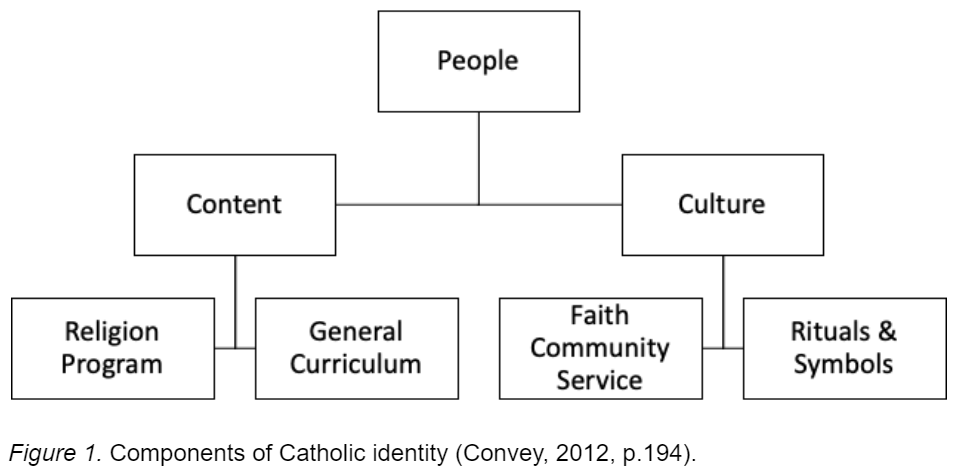
According to Convey (2012), some of the most important elements of Catholic school identity include a strong faith community, the teacher of religion being Catholic, starting the day with prayer, and Catholic teachings being presented in religious education courses, but also integrated into the general curriculum to the greatest extent possible. As not only a faith leader, but also the instructional leader in the school, it is the responsibility of the principal to oversee all aspects of Catholic identity and culture, from religious instruction to faith activities, liturgies, and service projects.
In order to fulfill these responsibilities, the principal must possess a deep understanding of Catholic teachings and their relevance to modern society. This requires ongoing professional and faith development, as well as a willingness to engage in theological reflection and dialogue with others in the school community. Additionally, Catholic school principals are called to model Catholic values and teachings in their own life. This involves living out the faith in their personal and professional life and being a visible and authentic example of faith for the school community.
In addition to promoting Catholic teachings and values within the school, the principal as a faith leader must also work to build strong relationships with the broader Catholic community. This can involve collaborating with the local parishes, diocese or eparchy, and other Catholic organizations (i.e., Catholic Social Services, Society of Saint Vincent de Paul, etc.) to promote shared goals and initiatives. It also involves being an active participant in diocesan or eparchial events and initiatives, and fostering a sense of connection between the school and the wider Catholic community.
With so much good news to share, the principal as a faith leader must be able to effectively communicate the school's Catholic identity to stakeholders both within and outside of the school. This requires the development of clear and compelling messaging that conveys the school's mission and values, as well as the successes and challenges of the school's faith-based initiatives. It also involves actively engaging with the media and other external stakeholders to promote the school's Catholic identity and achievements. This requires leadership and guidance at the division level, regardless of whether or not there exists a dedicated communications individual or department, to ensure that communication meets a basic standard and aligns with the mission and vision of the school jurisdiction.
The principal's role as a faith leader in Alberta's Catholic schools is a complex one that requires a broad range of skills and expertise. By promoting Catholic teachings and values, cultivating a strong Catholic culture within the school, building relationships with the broader Catholic community, and effectively communicating the school's Catholic identity to stakeholders, the principal as a faith leader plays a critical role in shaping the faith and character of the school community. What’s more, is that this must all be accomplished while attending to all other elements of leadership in the school, as articulated in both the Alberta Education Leadership Quality Standard (LQS) and its Catholic sister document, the Council of Catholic School Superintendents of Alberta (CCSSA) Catholic Leadership Standard, which adds to the LQS the component of Embodying Catholic Leadership and permeates faith through all other aspects of school leadership. The interconnectedness of all aspects of leadership is depicted in the below graphic, which was adapted from a similarly-styled graphic developed by the College of Alberta School Superintendents.

In conclusion, the role of the principal as a faith leader in Alberta's Catholic schools is multifaceted and essential to fostering a strong Catholic identity within the school community. Through integrating Catholic teachings into the curriculum, actively engaging the school community in the faith, promoting service to the community, working closely with clergy, families, and Catholic agencies, and modeling Catholic values and teachings, the principal is able to create a Catholic learning environment that inspires students and staff to live out their faith in their personal and professional lives. To generalize, the faith leadership role of the Catholic school principal can be defined as living gospel values and serving as a Catholic role model to the school community while working to permeate faith into all aspects of the work of school management and leadership. Sounds simple enough.
References
Convey, J. J. (2012). Perceptions of Catholic identity: Views of Catholic school administrators and teachers. Catholic Education: A Journal of Inquiry and Practice, 16(1), 187-214. doi:10.15365/joce.1601102013
Council of Catholic School Superintendents of Alberta. (2019). CCSSA Catholic leadership quality standard competency braid [Graphic].
Dr. Clint Moroziuk has worked in Catholic education for the past 26 years and has served as the Chief Superintendent of Greater St. Albert Catholic Schools since 2020. He holds a Bachelor of Education from the University of Alberta, a Master of Arts in Education from the University of Phoenix, a Master of Religious Education from Newman Theological College, and a Doctor of Education from the University of Calgary. He recently collaborated on designing a course for the Master of Education program at St. Mary’s University in Calgary and looks forward to serving as an instructor in that program in the future.
- Details
- Written by Brett Fawcett
- Category: Education Philosophy
The Three Forms of Permeation
Previously on this blog, I reflected about what it means to say that Catholic schools should be characterized by permeation. (Some, with good reason, prefer the word “integration,” and, if you are one of these people, you can feel free to mentally replace “permeation” with “integration” every time it appears in this post.) I suggested that there are three forms of permeation: Worldview permeation, worship permeation, and witness permeation.
Since writing that post, it has occurred to me that these three forms of permeation roughly correspond to the three offices of Jesus Christ: Prophet, Priest, and King.
- The prophet’s mission was to preach the law of God, to explain to the people of God what that law called on them to do in every aspect of their lives, and to remind them of God’s promises. This corresponds to worldview permeation.
- The priest’s function was to make the sacrificial offerings to God and to officiate over the people’s liturgical celebrations. This corresponds to worship permeation.
- The king’s job was to rule the people in accordance with God’s laws and to execute justice, especially on behalf of the poor and downtrodden. This corresponds to witness permeation.
Jesus fulfills all these roles, and permeation is therefore a participation in the ministry of Jesus Christ as applied to the work of education. (This should remind us that permeation is also impossible unless it occurs through Jesus Christ, Who has sent His Spirit to empower us to carry on His mission.)
But the question then arises of who is supposed to do this work. The Magisterium (that is to say, the Church exercising her authority to teach) has consistently stated that the task of permeation in a school falls primarily to its teachers–not to administrators, trustees, parents, students, or support staff (though every one of these groups has an important role to play as well), but to the teachers. Having solid Catholic teachers may not be a sufficient condition for a permeated school (for example, you could have a school full of great Catholic teachers who are stifled by bad policies), but it is a necessary one.
What Kind of Teachers?
The Catholic School Superintendents of Alberta (CCSSA) has recognized this and have produced excellent criteria for identifying the kind of teacher a school needs if permeation is going to take place there. (Remember, permeation is the work of the Holy Spirit, not us, but God works through instruments, and so a principal will want to hire teachers who are able and willing to serve as His instruments.)
One such metric is the Catholic version of the Teaching Quality Standard (TQS), which takes the provincial standards for teacher professionalism and adds various indicators that are particular to Catholic education. For example, the TQS used by public schools lists “Engaging in Career-Long Learning” as a competency teachers should strive for. In addition to the indicators listed in that version, the Catholic TQS includes “[s]eeking personally to grow in his or her spirituality and faith, understanding of Catholic teachings and doctrine” as one of the signs of this competency.
This is helpful, but it is worth remembering that the TQS is a secular set of criteria onto which the Catholic TQS imposes a distinctively Catholic perspective. This is fine, as far as it goes, but one wonders if there is not a criteria for Catholic teachers that starts with the question, “What kind of teacher can God use for permeation?”
One possibility here is found in a helpful CCSSA document called “The Excellent Catholic Teacher.” To tease out the criteria for such a teacher, this text essentially works backwards from Archbishop Miller’s five marks of a Catholic school, that is: A Catholic school is (1) grounded in a Christian anthropology, (2) imbued with a Catholic worldview, (3) animated by a faith-infused curriculum, (4) sustained by Gospel witness, and (5) shaped by a spirituality of communion. Based on these, the CCSSA document identifies the “five marks of an excellent Catholic teacher”:
- “An excellent Catholic teacher recognizes that each person has an eternal destiny and is created in the image of God.”
- “An excellent Catholic teacher expresses and develops a living Catholic vision of the world.”
- “An excellent Catholic teacher permeates faith and wisdom through pedagogy and curricular content.”
- “An excellent Catholic teacher witnesses to others a life lived in relationship with Jesus Christ.”
- “An excellent Catholic teacher contributes to a spirituality of communion.”
This is undoubtedly a great list of things a Catholic teacher should do. After all, these are marks of an excellent Catholic teacher. By definition, a mark is something that is visible; it sets what is marked apart for the observer. An alert administrator should be able to observe an excellent Catholic teacher doing all of these things.
At this point, however, the philosophy teacher in me rears his punctilious little head and fussily insists on making two observations.
One of these observations is that there is such a thing as the fallacy of division. This is the logical mistake of assuming that, because something is true of a whole, it must be true of each of the parts of that whole. An example of this fallacy expressed in syllogistic form would be:
- A car is capable of self-propulsion.
- A steering wheel is part of a car.
- Therefore, a steering wheel is capable of self-propulsion.
Obviously, this is an error. The steering wheel, like all the other parts of the car, has a specific function; when all the parts are performing those functions correctly, then the whole car has the power of self-propulsion. This is the principle of emergence: Powers and properties that are not present in the individual parts emerge when they come together as a whole. “The whole is greater than the sum of its parts,” as they say.
I worry that we may be committing the fallacy of division if we reason thusly:
- A permeated Catholic school has five particular marks.
- Teachers are part of permeated Catholic schools.
- Therefore, each teacher will also have those five particular marks.
To put this differently, what makes sense when describing a whole school can be a bit puzzling when applied to a particular teacher. It makes sense to say a school, as an institution, should recognize the supernatural dignity of each student as well as be animated by a faith-based curriculum. On the other hand, for an individual, isn’t recognizing that each person is made in God’s image (the first mark) just an extension of having a living Catholic vision of the world (the second mark)?
In the same vein, couldn’t there be qualities an individual Catholic teacher must possess (such as classroom engagement skills) that can’t be predicated of the whole school? If so, then using the five marks, which apply to the entire institution, to understand the work of a single teacher runs the risk of leaving out qualities which are distinct to a teacher’s work. It is interesting that “The Excellent Catholic Teacher” includes an appendix on the Catholic teacher’s spiritual commitments and pedagogical style, perhaps indicating that the five marks do not adequately cover all the characteristics we should expect to find in a Catholic teacher.
The other observation comes from the Catholic philosophical tradition. As mentioned, these five marks refer to what a Catholic teacher does. But where does that doing come from? The medieval Scholastics, when working out their Christian philosophy of the universe, formulated a rule: operari sequitur esse. Roughly translated, this means that “the actions of a being flow from the nature of that being.” A teacher can only do the kind of actions described in the five marks if they already are a certain kind of person. 
To put this another way: You can’t just ask any given teacher to be able to do all these things. A teacher who lacks certain personal and professional qualities won’t be able to permeate faith and wisdom or witness to a life lived in relationship with Jesus Christ, just like a teacher without certain personal traits won’t be able to work in a Suzuki music school or a hockey academy. (Notice: Even if a teacher were a good educator and a fan of hockey, that wouldn’t mean he was suited to teach at a hockey academy. By extension, is a teacher ready for permeation just because she is a good teacher and a devout Catholic?) Before looking at whether a Catholic teacher does these things, we should consider what kind of teachers can do these things.
To that end, I would suggest that, beyond the marks of a Catholic teacher, we should be on the lookout for teachers with certain kinds of traits, personal characteristics that give rise to the actions from which a permeated school emerges.
The Five Traits of a Catholic Teacher
The Church’s Code of Canon Law lays down certain rules about who should be allowed to teach in Catholic schools. Canon 804 §2 declares that religious educators (which really means all teachers in a Catholic school, since all education in a Catholic school has a religious dimension) “are outstanding in correct doctrine, the witness of a Christian life, and teaching skill.” The 1982 Vatican document Lay Catholics in Schools: Witnesses to Faith add two further criteria: Catholic teachers should be able to work in community, which means collaborating with colleagues as well as with parents (para. 34) and “develop in themselves, and cultivate in their students, a keen social awareness and a profound sense of civic and political responsibility” (para. 19).
From these Church documents, then, we gather that a Catholic teacher must possess at least five traits:
- Knowledge of Catholicism
- Christian witness in life
- Pedagogical knowledge
- Skill in collaboration
- Sense of civic responsibility and need to instill this in students
There are two groups of traits here. The first two are unique to Catholic teachers. The last three can also be seen among non-Catholic teachers, but will look different in a Catholic teacher. I call these Permeation-Unique Teacher Traits and Permeation-Infused Teacher Traits, or PUTTs and PITTs. (Of course, you could also call them IUTTs and IITTs.) The PUTTs inform the other three traits and turn them into PITTs.
All teachers should be skilled in pedagogical technique. However, two equally skilled teachers could have two completely different pedagogical strategies. This matters because different pedagogical methods have different philosophies embedded in them, and some of those philosophies are more compatible than others with the Catholic view of reality. To take just one example: In the realm of early childhood education, compare the pure constructivism of the Reggio Emilia method, which developed in non-Catholic schools, to the emphasis on structured play-based learning in a Montessori classroom. This difference is not unrelated to the fact that Maria Montessori was a devout Catholic and therefore had a belief in objective truth that may not be present in the Reggio pedagogical philosophy. This does not mean a Catholic teacher in an early learning classroom must strictly follow Montessori and learn nothing from Reggio, but it does mean she will be aware of whether her pedagogy is in accordance with the Catholic worldview. This third trait is therefore to be understood through the lens of the first trait.
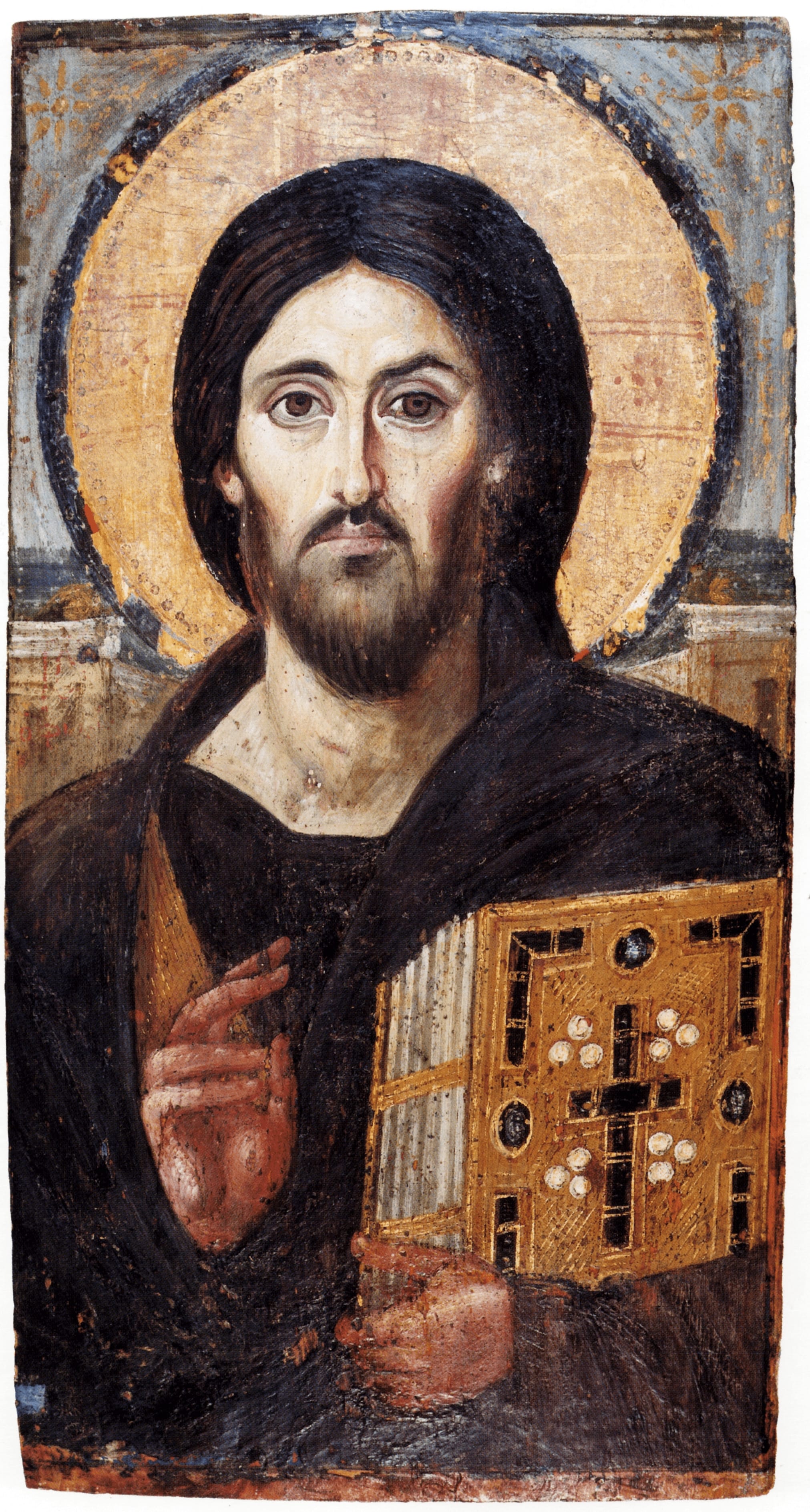 All teachers should have skills in collaboration, but, for a Catholic teacher, this is part of a broader “spirituality of communion,” to go back to the phrase of “The Excellent Catholic Teacher.” For her, this will be both an exercise in professionalism as well as a recognition that the work of Catholic education is always ecclesial (that is to say, rooted in the broader community of the Church). The Catholic teacher recognizes that she is part of the body of Christ and plays an important but subservient role in a bigger plan that God is working out in her school community. In collaborating – which often takes great humility – the Catholic teacher testifies by her actions that permeation is ultimately God’s work, not hers. The second trait therefore shapes this fourth one.
All teachers should have skills in collaboration, but, for a Catholic teacher, this is part of a broader “spirituality of communion,” to go back to the phrase of “The Excellent Catholic Teacher.” For her, this will be both an exercise in professionalism as well as a recognition that the work of Catholic education is always ecclesial (that is to say, rooted in the broader community of the Church). The Catholic teacher recognizes that she is part of the body of Christ and plays an important but subservient role in a bigger plan that God is working out in her school community. In collaborating – which often takes great humility – the Catholic teacher testifies by her actions that permeation is ultimately God’s work, not hers. The second trait therefore shapes this fourth one.
Finally, all teachers should be concerned for social justice, but what exactly – for a Catholic teacher – social justice looks like, and how to bring it about, is defined by Catholic Social Teaching as outlined in the Compendium of the Social Doctrine of the Church. Her vision of what is wrong with politics and the economy, and the steps we need to take to address those problems, will therefore look (at least a little different) than it does for her counterpart in a secular school. To wit: the secular teacher may not see a connection between contraception and climate change – both symptoms of what Pope Francis calls “the throwaway culture” (para. 22 of Laudato Si) – or between prayer and social activism; a Catholic teacher, however, will perceive these connections and model the inseparability of love for God and love for neighbour to her students. Both the first and the second traits are at play in this fifth one.
A teacher who possesses these five traits, or who is being formed in them and allowing God to develop them in her, is ready to participate in Christ’s prophetic, priestly, and kingly ministry in her work. A school staffed with teachers like her is one where permeation will emerge and the five marks will be visible for all to see.
Brett Fawcett teaches for Elk Island Catholic Schools at the Chesterton Academy of St. Isidore, and is a doctoral student at the University of Calgary.
- Details
- Written by John Wasch
- Category: Testimonial
548.
That’s a number that I keep on a post-it on my office wall. Why? It’s the number of service learning projects that the Catholic schools in our division completed last year.
Notwithstanding the dangers of vanity and pride, it’s a number that I’m happy to share when I speak about the blessings of Catholic schools. Students at all grade levels and in every location have the opportunity to identify areas of need, explore how they can make a difference, and then put their faith into action through service. In Calgary Catholic, we are blessed with a board of Catholic school Trustees that have expressed their commitment to providing service learning opportunities for all students as a priority item in our division’s three-year education plan. That expression provides staff with the direction that we need to prioritize such opportunities in our schools. 
Engaging in service learning isn’t just about meeting an arbitrary goal for dollars raised, or cans of soup collected; it’s an opportunity to provide real-life experiences grounded in Catholic social teaching. It gives our students (and staff) opportunities to demonstrate respect for the inherent dignity and worth of human beings, a preferential option for the poor, and active community participation.
It looks a little different in each place. Sometimes, it’s the delivery of custom made Christmas cards to a community seniors’ residence. Other times, it’s a school-wide commitment to Chalice and the provision of funds to support communities in the developing world. Always, there is an emphasis on knowing and praying for those we serve.
When we reflect on the wide variety of projects taken on by our schools, it is easy to focus on the immediate impacts. More important, however, are the students’ opportunities for self-transformation. By engaging in service projects, students can develop a deeper sense of empathy and compassion – and can learn to see the world through the eyes of others. Service learning can also help students develop a sense of purpose and meaning in their lives, as they recognize the importance of using their talents and abilities to make a positive difference in the world.
When we guide our students in service-learning, we teach them to imitate Christ in habits of heart, mind and action. And, when we speak about the distinctiveness of Catholic education, our commitment to service is something that is core to our being as Catholics. This very Thursday at Mass, for example, we will hear the Gospel reading that perfectly embodies that:
So if I, your Lord and Teacher, have washed your feet, you also ought to wash one another’s feet. For I have set you an example, that you also should do as I have done to you. (John 13:14-15)
We should be excited to celebrate and share the Good News of how our students are being transformed and carrying out these acts of charity in our schools. This school year is rushing towards its conclusion – soon, our schools will be reporting back about the service projects they completed. One post-it note will come down and the next will go up…and I can’t wait!
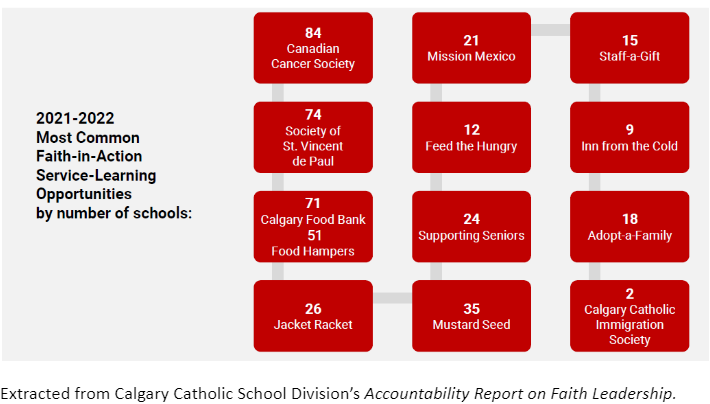
John Wasch currently serves as the Director of Catholicity for the Calgary Catholic School District. He has served as a teacher and administrator for 27 years in the field of publicly funded Catholic education.
- Details
- Written by ACSTA Staff - Brendan Cavanagh
- Category: Blog
Publicly-funded Catholic education in Alberta received strong words of support from both provincial parties at ACSTA’s reception for MLAs last Tuesday night in Edmonton. 60 representatives from 15 Catholic school divisions, as well as approximately 30 MLAs from both parties were in attendance – including the Premier, Opposition Leader, Minister of Education and Education Critic.

The event began with an Opening Prayer led by Edmonton Archbishop Richard Smith, followed by a treaty land acknowledgement and remarks from ACSTA President Harry Salm:
“The constitutional protection for Catholic education was one of the original minority protections – along with those held by our francophone and indigenous brothers and sisters – that allowed for the birth and development of the pluralistic society we have today,” President Salm stated. “In this province, over 173,000 of all students are educated by the Catholic school system. We should always keep in mind that this is an intentional decision made by Albertan families.”
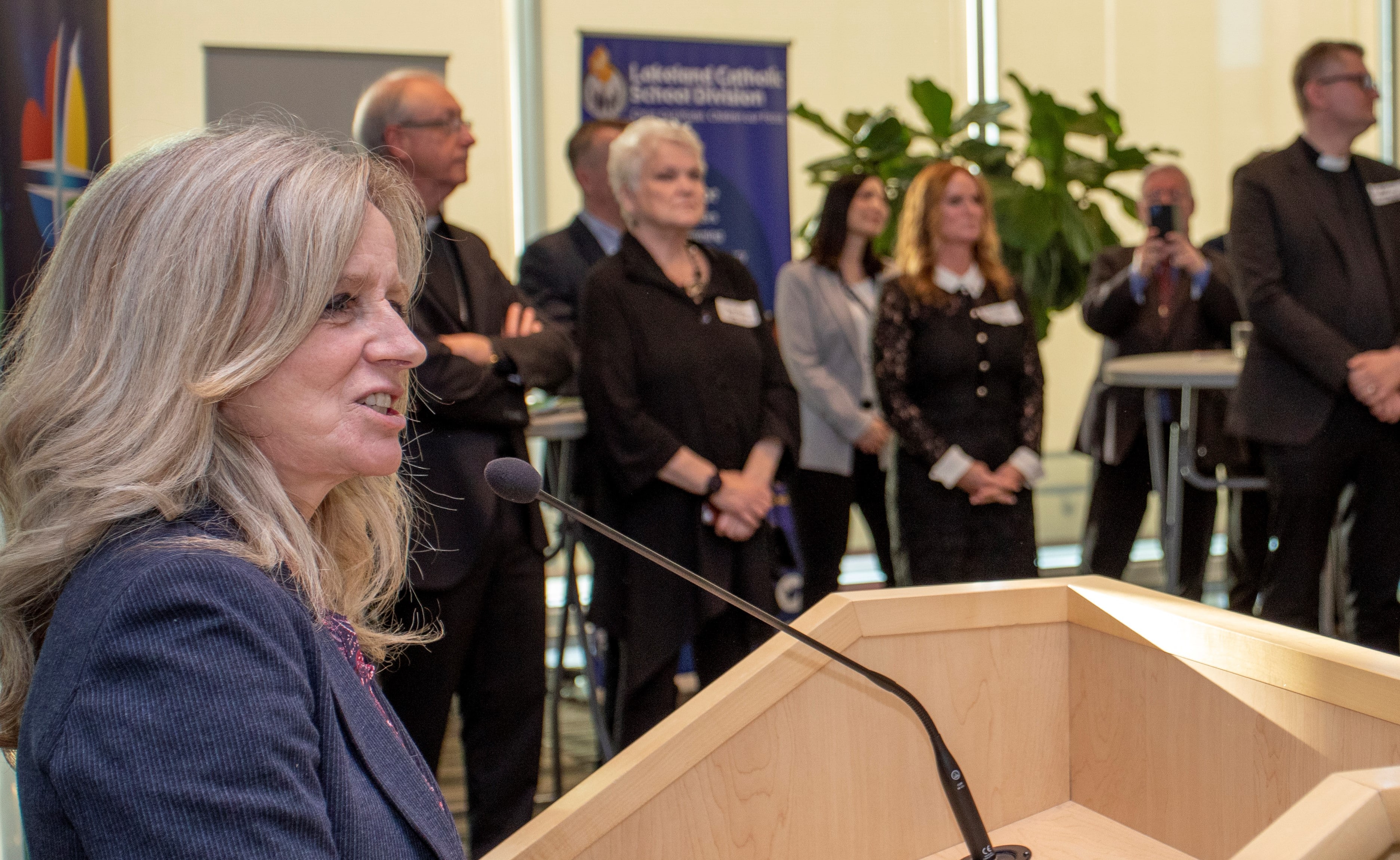
In addition to acknowledging the toll that COVID had taken on the education system, NDP Party Leader Rachel Notley emphasized the importance of providing sufficient funding to Catholic schools: “In my view, public education – whether the public system, the Catholic system, the Francophone system – needs to be well-funded, so we can continue to support our kids.”
“And I also look forward to the opportunity to work with you more in the future about how we can deliver the best public education - and the best Catholic public education system here for our kids across the province.”
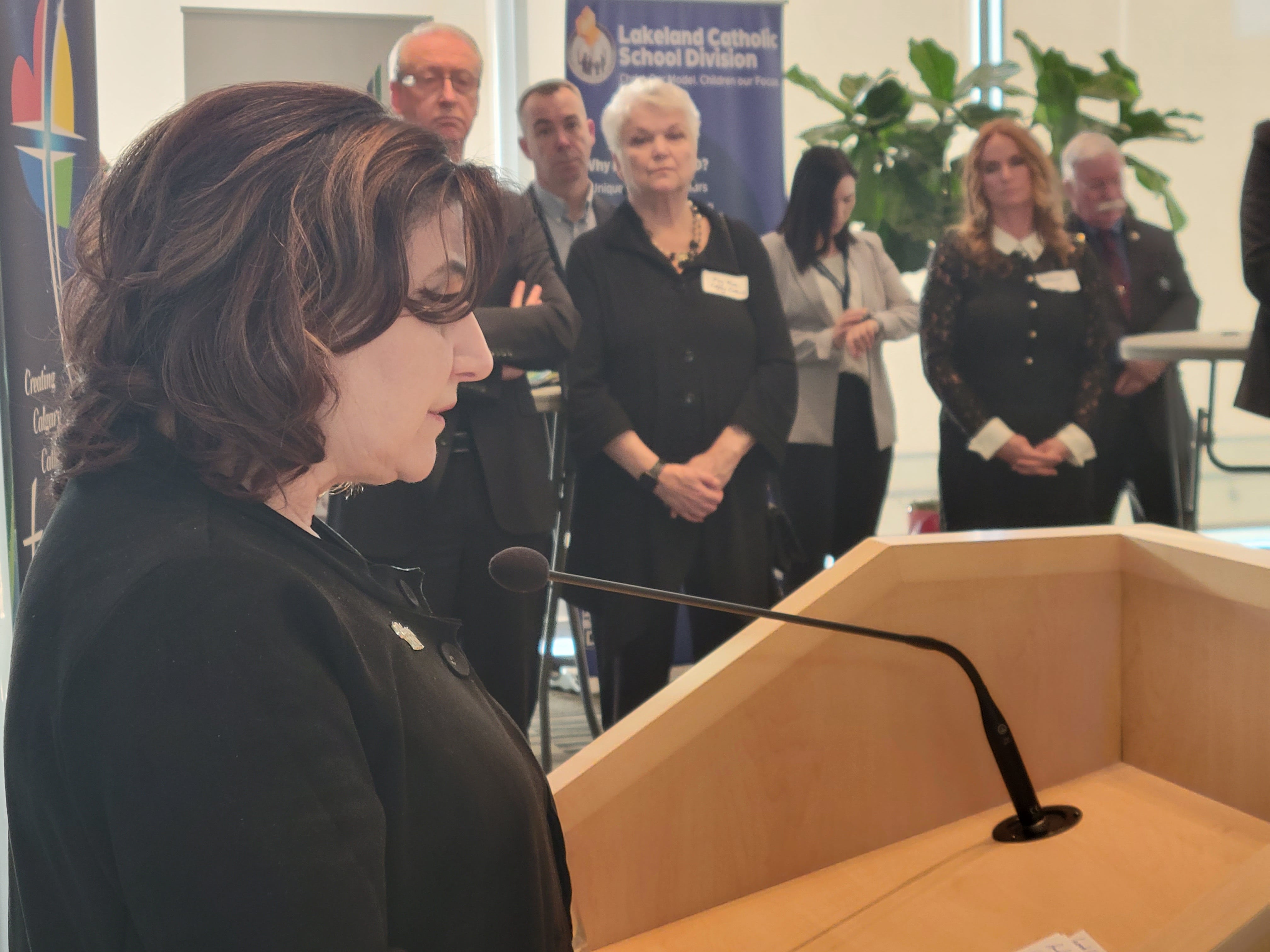
UCP Education Minister Adriana LaGrange spoke to the importance of choice in education, as well as the distinctive nature and value of faith-based education: “I’m so proud of our government's commitment to ensuring parents have the ability to choose a publicly-funded Catholic education for their children.”
“Catholic education is a constitutional right that many parents and students choose to exercise in our province.”
ACSTA represents 24 Catholic school trustees to the governments of Alberta, Yukon and the Northwest Territories with the mission to celebrate, preserve, promote, and enhance Catholic education. The MLA Reception is an opportunity facilitated by ACSTA for Catholic school trustees to engage with and educate provincial legislators about the history, constitutional protections, and current significance of Catholic education in Alberta.
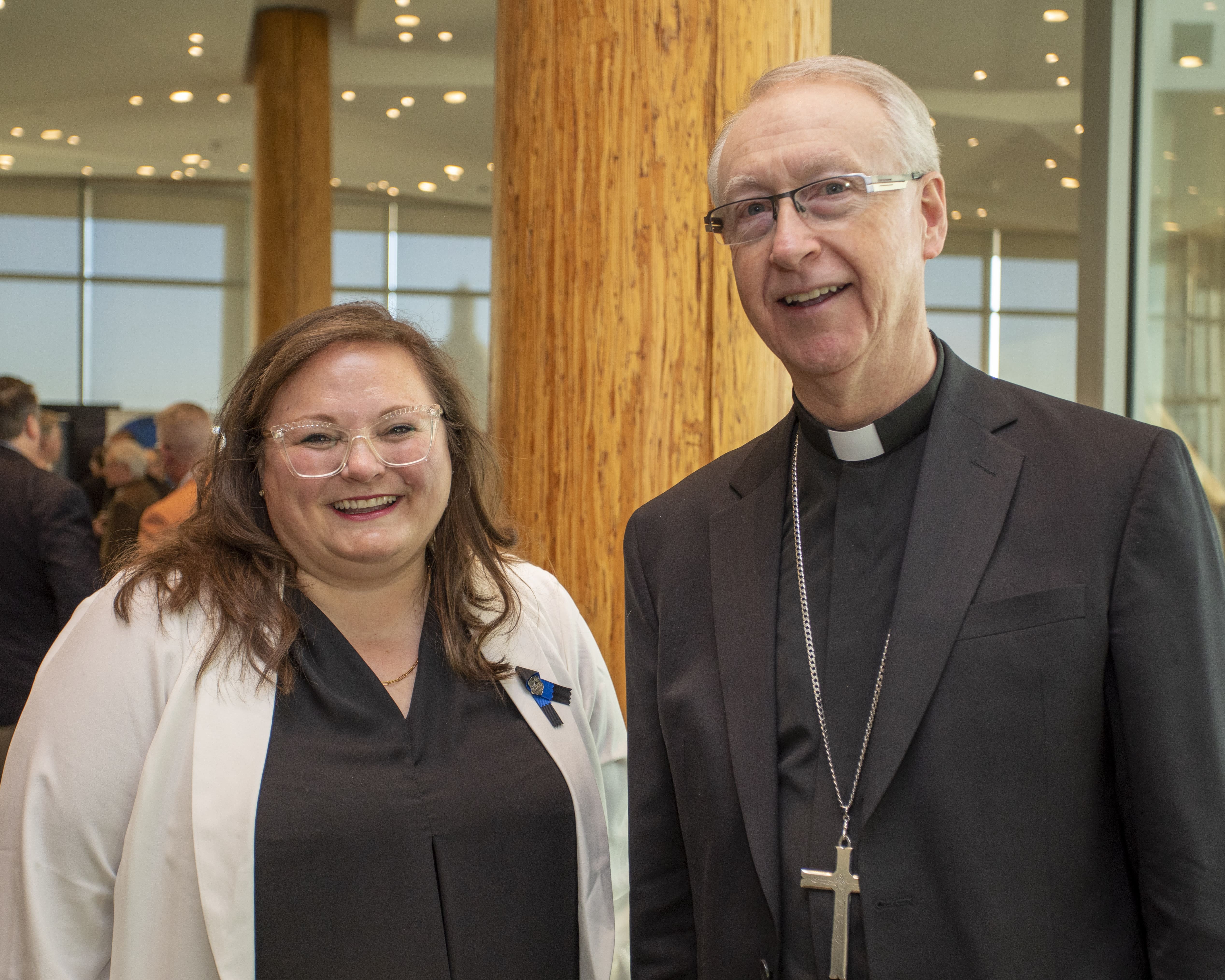
- Details
- Written by Matthew Kostelecky
- Category: Testimonial
Colleges and Universities have a long and storied history in the Catholic domain. Indeed, it was within a particular Catholic context that ‘the University’ as such came into existence. The Church continually sees the need for and places value in these places of inquiry and learning, for who is Christ if not the teacher par excellence? There are three post-secondary Catholic institutions in Alberta: St. Joseph’s College (Edmonton), Newman Theological College (Edmonton), and St. Mary’s University (Calgary). These three institutions have similar missions, mandates, and are jointly a net benefit to the larger project of Catholic education in Alberta. Our contexts are markedly different, however.
As the Dean of St. Joseph’s, I’ll be presenting the unique context of St. Joe’s, as it is affectionately called. Sometimes St. Joe’s is called ‘the best kept secret at the UofA’. One of my jobs is to make it the worst kept secret.
Who We Are:
We teach and research in Catholic thought at the premier public research university in Alberta and one of the best universities in the country, consistently ranking in the top 125 universities world-wide. We allow for a space at the University of Alberta where questions of meaning, faith, and human thriving can be integrated and asked in a qualified academic framework, and this provides added value to UofA students, to the UofA at large, and to Catholic education in Alberta.
Some basic facts:
- St. Joe’s has 8 full-time tenure-track professors and 2 professors emeriti with PhDs from some of the best universities in the world (Toronto, Leuven, Cambridge, Alberta, Catholic University of America)
- We have a team of 20-25 talented, dedicated ‘sessional’ instructors, many of whom have terminal degrees in their field and extensive practical experience as educators or educational administrators.
- Our professors and instructors have cumulatively published over 20 books and 80 articles in the last 7 years, many in the most prestigious academic venues in their fields.
Teaching:
What really animates St. Joe’s Academics is teaching. We are passionate about teaching within our context, to Alberta’s and Canada’s future leaders, and all our classes are UofA Arts options.
We teach approximately 2000 students per year across +/- 70 courses and these cover the gamut of religious education, biblical studies, moral theology, history of Christianity, philosophy, science and religion and beyond. Our students regularly speak to the transformative impact of these courses on their personal, academic, and professional lives. St. Joe’s is a gem at the UofA and in Alberta – for there is nowhere else in Alberta that students at a public research university, who otherwise would not be educated by remarkable instructors in Catholic thought, take such courses.
Our Programs:
- Certificate in Catholic Education: This Certificate is a four-course sequence designed to introduce students to teaching in the Catholic primary and secondary system in Alberta. The Certificate ladders from general exposure to Catholic fundamentals (the first two courses treating, broadly, the Bible and fundamental catechetics) to pedagogical issues of how to teach within a Catholic district context. In sum, the Certificate provides a broad exposure to both fundamentals of Catholic doctrine and practical issues of how to teach in a Catholic context. We have signed MOUs with 11 of the 18 Catholic school districts in Alberta for the Certificate, which allows the Certificate to be considered a ‘hiring asset’ in our collaborating districts and helps connect potential teachers to recruiting districts.
- Minor in Christian Theology: In any given year, we have 30 to 40 minors in Christian Theology, which students choose to take as a supplement to their chosen course of studies at the UofA.
Campus Ministry, Chapel, and Residences:
St. Joe’s is a community with the larger UofA community, a place that many students call ‘home’ both literally and figuratively. We offer the only single-sex residences at the UofA, with spaces for 284 women in a newly built facility and 63 spaces for men in our historic building. These residences are a basic aspect of our community, as is our thriving campus ministry and chapel community. St. Joe’s offers daily mass and has 4 masses over the weekend, with 7pm Sunday mass catering in particular to St. Joe’s and UofA students.
Final Thoughts...
St. Joe’s is a remarkable place at the heart of a major research university, where Canada’s future leaders can be exposed to the richness of Catholic thought and spirituality as they embark on the next phase of their lives. It is a place that, together with St. Mary’s University and Newman Theological College, benefits Catholic education in Alberta and the Church in Alberta and beyond.
Dr. Matthew Kostelecky is the Vice-President (Academic) and Dean of St. Joseph's College at the University of Alberta. He holds a PhD in philosophy from the Katholieke Universiteit Leuven, specializing in the thought of St. Thomas Aquinas, as well as a BA in philosophy from the University of Dallas. Prior to joining St. Joseph's College in 2009, Dr. Kostelecky was an Assistant Professor at St. Francis Xavier University in Nova Scotia.

